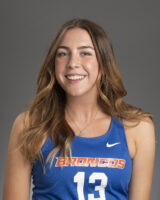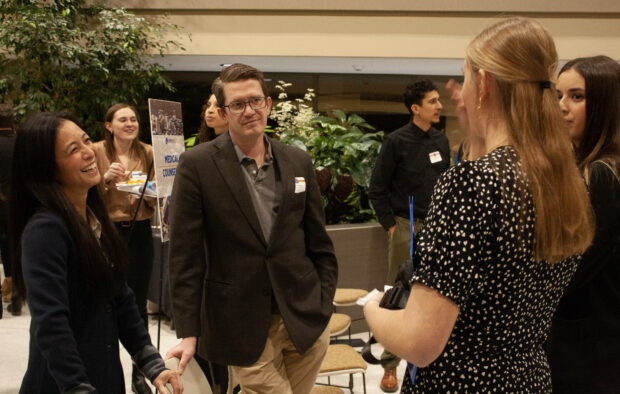About 170 Boise State University student-athletes met with 130 business executives at Albertson’s headquarters in Boise on Monday to gain insight from professionals, explore different career paths and expand their network.
The annual event is part of a BSU program called BroncoLife, which provides programming to 350 student-athletes designed to help their lives beyond athletics, including mental, physical, and emotional support, and career exploration.
“Our BroncoLife program is one of the most important pieces of what we do here in Bronco athletics,” Director of Athletics Jeramiah Dickey said.
State Superintendent of Public Instruction Debbie Critchfield met with the students before they scattered to explore different job opportunities.
“So as you think about those things that interested you when you were young, I would ask you to really reflect upon why that was interesting to you. All of those things still apply to you today and you have an opportunity tonight to go and explore some of those things that have been in the back of your mind, or some of those things that interest you,” Critchfield said.

BSU freshman and women’s beach volleyball player Aris Vetter appreciated the event because full-time student-athletes have no time to explore careers or participate in internships.
“We spend so much of our time practicing and going to tournaments that we don’t have as much time as other people to do extracurriculars that might look good on a resume or even just to test out different career paths,” Vetter said.
She added that being a student-athlete has its advantages when trying to get hired.
“(Being a college athlete) shows employers that we do work well under pressure, we manage our time, we work well with others,” Vetter said. “I think there’s more benefits than cons, because it shows a lot about our character.”
Caden Moorgat, who plays for BSU’s men’s tennis, explained how his athletic career has prepared him for the workforce and his interest in electrical engineering and microprocessors.
“There’s so many valuable skills that you learn, that you have to learn being a student-athlete — time management and teamwork, just to name a couple,” Moorgat said. “If I’m in a position where I’m thrown into a job that maybe I don’t have all the tricks and all the qualifications for, that I can learn and handle that adversity and be resilient. I feel like I learned that through sports. I learned that through my coaches and my teammates and competing every weekend.”
Moorgat explained that, while he is currently interested in microprocessors, he still has another year to figure out his future and explore his passions with his upcoming classes.

